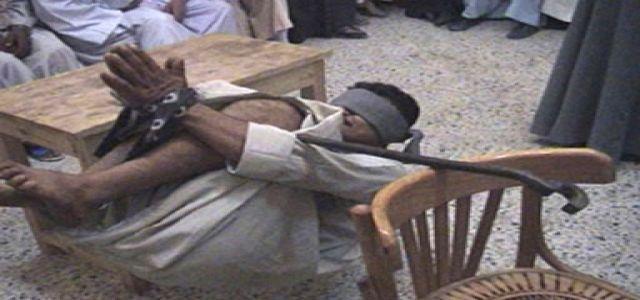- Human Rights
- October 26, 2008
- 5 minutes read
January 7, An Egyptian Day Against Torture

A number of Egyptian human rights organizations identified January 7 of every year as being the Egyptian day against torture, to accord it with the day in which the Egyptian government published its agreement of resisting torture, in 1988, in the Egyptian official newspapers.
Ahmed Seif al-Islam stated during the press conference held by the Commission of Prisoners of Opinion, and Hisham Mubarak Law Center, that a number of Egyptian organizations chose January 7 of every year to be a day against Torture, in an attempt to launch a great human right and media campaign to reveal executioners of torture in Egypt, to exert pressure on the Interior Ministry to investigate the crimes of torture which occur every day before everyone and in the streets.
Saif al-Islam added in the conference where some of the families of the recent torture”s victims had testified: “The Egyptian human rights organizations took up the responsibility to prosecute those involved in the cases of torture, by using all legal means in and outside Egypt, as what has happened before in the case of harassing female journalists on the referendum day in 2004, when the file of the case was introduced to the African Commission on Human Rights.”
In her testimony on what had happened to one of her relatives, Shaimaa Jalal the relative of Bilal Mohamed Abdul-Rahman, a broadcaster in Al Nas Channel and the one who was subjected to torture in the time when Dr. Abdul Rahman Al Ber was arrested in October 4,2008, said: “The state of Bilal Abdul-Rahman, who was arrested from the house of Dr. Al Ber and was assaulted by the state security officers, is very bad these days which is the last thing that his family knew about his state of health, especially that his family were prevented from visiting him after transferring him to Al Qasr Al Eynni Hospital because of his serious state.”
Shimaa added: “Abdul Rahman”s state of heath is very serious as a result of the attack he was subjected to by the police officers during the investigation, and despite the fact that Bilal told them that he is working in Al Nas Channel which has nothing to do with politics at all, they unfortunately did not care or listen to him, and they exercised their usual method of torturing and assaulting.”
While Moaaz Abdul Karim, the friend of the detained student Abdul-Rahman Talaat who photographed Bilal Abdul-Rahman during his transferring to the hospital, said that the detained student was not the one of the published clip, but the state security officer wanted to get out of the impasse by arresting the student on charges of photographing the broadcaster Bilal, but when the prosecution found that the charge of violating the freedom of a citizen and photographing him without permission, is a fragile one, it accused him of the belonging to an outlawed group, so he was referred to the prosecution of Supreme State Security.
Hatim Abdul Wahab, a lawyer and a member in the council of the Lawyers Syndicate in Giza, criticized the attitude of the general prosecution against the student Abdul Rahman Talat, which referred him to the prosecution of Supreme State Security, and changed the charges without any legal basis, confirming that he is worried as a lawyer that the law will become as “a dead letter” and that the Interior Ministry will continue to exert pressure on prosecution.
On the other hand, the wife of Hamada Abdul-Latif – the one who suffered from a quadriplegia as a result of being assaulted by the police during Al Jazeraa School”s events – demanded the adoption of the media to the case of Hamada, saying that today Hamada has been assaulted and put in the custody, and it is expected that all of us will be trampled on by shoes if we will not react.
Kalaf Bayoumi, a lawyer and the head of the defense of the accusers in the case of Al Jazeraa School, said: “There is a pressure exerted by the state security on the witnesses, in prisons, in the case of Al Jazeraa School, including Hossam Al Wakeel, for not to testify in the case of Hamada Abdul Latif, and the most important evidence that the four accusers have been put in prisons in several governorates in Cairo, in Wadi Al Notroun, in Burj Al Arab and in Al Hadra prison, in addition to the fact that the questioning of the accused officer of assaulting Hamada Abdul Latif was not in our presence, and we could not look into his statements. “
The press conference was ended after watching a video showing the broadcaster Bilal Mohamed Abdul-Rahman while he is narrating how the state security officers tortured him.



